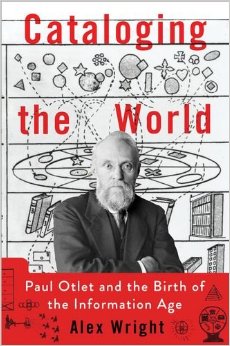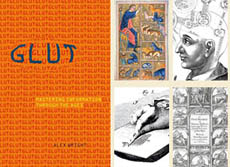Q&A with Nick Carr
July 13, 2010
I recently reviewed Nick Carr's new book The Shallows for Interactions (which, alas, requires an ACM subscription to read online). To accompany the piece, I also conducted a brief Q&A with Carr, which I'm taking the liberty of reprinting here:
--Alex Wright: In your book, you argue that the Internet has lured many of us into a state of constant distraction that is degrading our capacity for deep thinking and reflection. Do you see "switching off" as the only practical antidote, or can you envision a role for technology in trying to ameliorate these effects?
Nicholas Carr: I think that new information technologies could, in theory, help to promote attentiveness and deep thinking, countering the effects of the networked computer as it's currently designed and used. But I doubt that will happen. There are already a lot of PC applications designed to promote focus by disabling multitasking or networking--like Freedom for the Mac--but very few people use them, so far as I can tell. A long time ago, we made a decision that we wanted our computers to be multitasking, message-streaming, multimedia interruption machines, and I don't see any indication that we're going to reverse that decision. Indeed, if you look at the direction of personal computing, particularly the recent rise of social networking services like Facebook and Twitter, you see a strong bias toward providing ever more interruptions and distributing information in ever smaller chunks. People seem to be willing, even eager, to sacrifice the depth of their thinking in return for a greater sense of connectedness. Chatter seems to be valued more highly than contemplation or reflection, sadly. Technologies tend to do what they're uniquely good at, and computers are good at processing lots of bits of information very quickly. I don't think they're going to slow down, and I don't think they're going to slow us down.
Alex: Many of our readers are designers and researchers involved in creating interactive systems. How could a better understanding of brain plasticity help design teams improve the lives of people who rely on Internet-based software and services?
Nicholas: The most important lesson is simply that decisions about the design of information and communication systems have enormous ramifications--they can literally change the way our brain cells connect and our minds function. And, as many recent studies of neuroplasticity reveal, those cellular and functional changes don't go away when you turn off your computer or close out of an application. Our brains are very good at strengthening the mental functions we exercise and pruning away those we don't. So there's a deep ethical dimension to software design, and it's a dimension that, unfortunately, has rarely received much notice. When we program computers, we're also, in a very real sense, programming the minds of the users of the computers. The ethical dimension is particularly salient when it comes to designing educational applications and services, particularly those geared for use in elementary or middle schools. The brains of younger kids are particularly malleable. There's been a lot of research into how interruptions, multitasking, and even hypertext can hinder comprehension and learning, mainly by overloading people's short-term working memory, and I really think programmers and Web designers would be wise to familiarize themselves with that research--and maybe even take it into account in their work.
Alex: On several occasions, you cite the work of the late linguist Walter J. Ong. I was surprised that you didn't give more consideration to his notion of "secondary orality": that is, the evident similarity between certain forms of electronic media and ancient patterns of spoken-word communication. From your research, do you see any fundamental differences in the way we process "oral" electronic text versus more traditionally literate forms of online writing?
Nicholas: You're right; Ong pointed out certain similarities between modes of communication in preliterate, oral cultures and those promoted by modern media, from telephones to computers. Both put an emphasis on communal conversations and on immediacy. But he also pointed out how our new "secondary orality" differs from primary orality in fundamental ways. Communication in true oral cultures is always embodied in a whole person--it comes through direct, face-to-face contact--whereas conversation today is increasingly disembodied, mediated by machines and networks. One thing that shift suggests is that we're moving away from thinking of ourselves as members of local, physical neighborhoods and toward a sense of ourselves as participating in abstract communities, groups of disembodied avatars. The emphasis on immediacy is also growing ever stronger, I think--as we see Internet companies increasingly stress "real time" messaging. You could argue the constant flow of real-time information replicates the conversational communications of oral societies. But what's missing is the longer, more narrative, more immersive forms of communication that in the past characterized both oral and literary cultures. The Net provides no space for Homeric discourse and no incentive for the kind of deep attentiveness that such discourse demands.
Alex: Umberto Eco once drew a distinction between "books to be read" (like novels and poetry) and "books to be consulted" (like dictionaries and encyclopedias), arguing the latter will inevitably be subsumed into the Net, while the former may persist in printed form for a long time to come. What is your take on this argument: Do you believe all books are destined to "go digital," or do you see a continuing place in print for long-form narrative?
Nicholas: I don't think printed books, or even printed newspapers and magazines, are going to disappear anytime soon. New media displace old media, but they rarely destroy them immediately. Because the old media have certain attractive properties that the new media lack (not to mention sentimental attachments), they tend to live on for a long time, sometimes indefinitely. So while we tend to focus today on whether the Web will kill the newspaper or the e-book will kill the book, I think the most profound changes are taking place at a deeper level. Our reliance on computers and the Net is training us to take in information in a certain way--fast, distracted, in small bits--and that training will, in time, alter our general reading and thinking habits. In my own life, I've found that, as I come to use the Net more, it becomes harder and harder to sit down and immerse myself in a book or, for that matter, to engage in any prolonged act of concentration. There are two huge intellectual and cultural implications to that kind of mental reengineering. First, while the form of the book will live on, the printed page will increasingly be pushed from the center of our cultural life, where it has stood for some 500 years, to the periphery. That process is already well under way, I would argue. Second, writers will change the way they write in order to accommodate the new reading habits promoted by the Web, so even the content of books will come to resemble the content of the Web. The line between "books to be read" and "books to be consulted" will blur, with the latter becoming ever more dominant.
Alex: During the course of writing your book, you recount the experience of "unplugging" for long periods of time to concentrate on your work. Yet eventually you seem to resign yourself to a return to the networked world. What advice would you offer to readers trying to moderate the influence of "always on" networks in their own intellectual lives?
Nicholas: Popular technologies tend to become deeply embedded in social processes. Look at the automobile, for instance. For many people today, the networked computer is so thoroughly entwined with their work and social lives that "unplugging" is not a practical option--and, in fact, is not even an idea that they'd consider. So, being something of a fatalist, I don't think the intellectual trends I describe in The Shallows are going to be reversed. That said, each of us still has a choice. Each of us controls how we focus, or fail to focus, our attention. That control over our mind, you could argue, is one of the things that makes us human. If you cherish the more contemplative, reflective, quiet modes of thought, which I personally believe are essential to a rich intellectual life, you have to begin to disconnect. That's very hard, but I see no other option.
Previously: Welcome Colin
Now available for pre-order:

Cataloging the World:
Paul Otlet and the Birth of the Information Age
by Alex Wright
A “shrewd, brisk biography.”
—Kirkus Reviews
GLUT:
Mastering Information Through the Ages
by Alex Wright
“A penetrating and highly entertaining meditation on the information age and its historical roots.”
—Los Angeles Times
